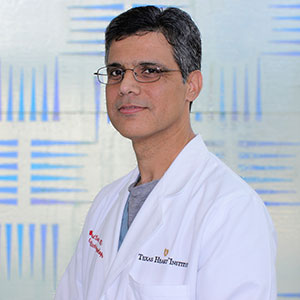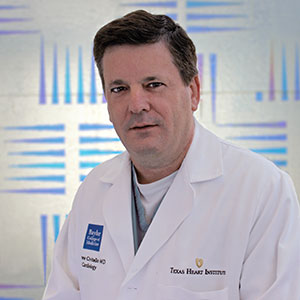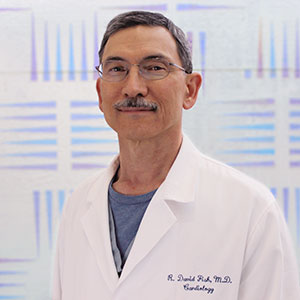Texas Heart Institute® Cardiovascular Disease Fellowship at Baylor St. Luke's Medical Center
Cardiology Subspecialty FellowshipsElectrophysiology Program Director - Mohammad Saeed, MD, FACC
The ACGME-accredited Clinical Cardiac Electrophysiology Fellowship is sponsored by Baylor College of Medicine and based at the Baylor St. Luke's Medical Center.
The goal of this training program at St. Luke’s/Texas Heart Institute is to train excellent, scholarly, clinical cardiac electrophysiologists with a vast and diverse experience in clinical and interventional electrophysiology. We intend to train leaders in the field of CCEP who will function as practitioners, teachers and researchers.
This program accepts one to two trainees per year in CCEP, and provides a unique opportunity for training. The CCEP resident evaluates elective cases in the outpatient setting of and the Texas Heart Institute outpatient clinics. He/she also evaluates inpatient consults or admissions at St. Luke’s. The same fellow then performs the EP study under direct and constant supervision, discusses management and provides further care and management.
A special feature of this program is that the CCEP fellows has constant faculty supervision, guidance and training and is never placed in a position that requires him/her to perform duties beyond their level of training. We accept two trainees, and there has been a 100 percent EP Board pass rate.
 Dr. Mohammad Saeed focuses his practice on treatment and prevention of cardiovascular arrhythmias. He is a diplomate of the American Board of Internal Medicine, Cardiovascular Diseases, Clinical Cardiac Electrophysiology and Fellow American College of Cardiology. He specializes in implantation of pacemakers, implantable defibrillators, biventricular devices and ablation of complex cardiac arrhythmias including atrial fibrillation. He is also active in research in order to better understand and treat life threatening arrhythmias. Dr. Saeed's research work has been extensively published and presented both nationally and internationally. Dr. Mohammad Saeed focuses his practice on treatment and prevention of cardiovascular arrhythmias. He is a diplomate of the American Board of Internal Medicine, Cardiovascular Diseases, Clinical Cardiac Electrophysiology and Fellow American College of Cardiology. He specializes in implantation of pacemakers, implantable defibrillators, biventricular devices and ablation of complex cardiac arrhythmias including atrial fibrillation. He is also active in research in order to better understand and treat life threatening arrhythmias. Dr. Saeed's research work has been extensively published and presented both nationally and internationally.
Electrophysiology Cardiology Teaching Staff
Jie (Jay) Cheng, MD
Alberto Lopez, MD
Nilesh Mathuria, MD
Abdi Rasekh, MD | Joanna Molina Razavi
Mehdi Razavi, MD
Mohammad Saeed, MD
John Seger, MD
|
Advanced Heart Failure and Heart Transplant Program Program Director - Andrew B. Civitello, MD, FACC
The Texas Heart Institute at BSLMC Advanced Heart Failure and Transplant Cardiology Fellowship Program has been in existence since 2004. Over 18 national and international fellows have completed the program since its inception and we remain one of the busiest left ventricular assist device and heart transplant programs in the United States.
Our program trainees benefit from a unique collaboration between the Texas Heart Institute (THI) BSLMC and Baylor College of Medicine (BCM), and consists of the following training venues: Outpatient heart failure, Transplant and LVAD clinic, Heart Failure ICU, Post-heart transplant/LVAD ICU and nursing floor, Cardiac catheterization and biopsy lab and Research.
The Advanced Heart Failure and Transplant Cardiology Fellowship is an approved Graduate Medical Education (ACGME) Council program at Baylor College of Medicine, and an accredited fellowship subspecialty program of the ACGME since 2015. Our training and goals meet or exceed the United Network of Organ Sharing (UNOS) and the American Society of Transplantation (AST) training guidelines. The one-year fellowship begins July 1 and concludes June 30. At the end of the program, the fellows qualify to serve as a medical director of a UNOS certified heart transplant program and are eligible for certification in the subspecialty, Advanced Heart Failure and Transplant Cardiology, by the American Board of Internal Medicine (ABIM).
 Our Faculty — The Texas Heart Institute at BSLMC Section of Heart Failure teaching staff consists of full-time ABIM board certified advanced heart failure and transplant cardiologists, advanced practice providers, heart transplant coordinators, LVAD coordinators and additional support staff. Annually, the program performs 40-50 heart transplants, 70-80 ventricular assist devices, 5,000-6,000 heart failure outpatient visits, over 1,000 hospital admissions and more than 300 endomyocardial biopsies. Active programs in advanced heart failure surgery and structural heart disease at BSLMC provide unparalleled opportunities for our fellows to learn and interact with our faculty, THI Professional teaching staff and heart failure patients. Our Faculty — The Texas Heart Institute at BSLMC Section of Heart Failure teaching staff consists of full-time ABIM board certified advanced heart failure and transplant cardiologists, advanced practice providers, heart transplant coordinators, LVAD coordinators and additional support staff. Annually, the program performs 40-50 heart transplants, 70-80 ventricular assist devices, 5,000-6,000 heart failure outpatient visits, over 1,000 hospital admissions and more than 300 endomyocardial biopsies. Active programs in advanced heart failure surgery and structural heart disease at BSLMC provide unparalleled opportunities for our fellows to learn and interact with our faculty, THI Professional teaching staff and heart failure patients.
Dr. Andrew Civitello is
board
certified in Cardiology, Interventional Cardiology and Advanced Heart Failure
and Transplant Cardiology and serves as the Medical Director of the Heart Transplant Program at
Texas Heart Institute as a member of the THI Professional Staff.
He
received his medical degree from The University of Texas Health Science Center
in Houston. His extensive training includes internship, residency and a year as
Chief Medical Resident at The University of Texas Health Science Center in
Houston, followed by fellowships in Cardiology and Interventional Cardiology at
Baylor College of Medicine and the Texas Heart Institute. Dr. Civitello
specializes in interventional cardiology and peripheral vascular procedures,
with advanced training in heart failure management and heart transplantation,
general and interventional cardiology, including cardiac catheterization, CT
angiography, nuclear cardiology, and advanced training in peripheral artery
interventions. The major focus of Dr. Civitello’s clinical and research interests
include advanced heart failure management, mechanical circulatory support, and
heart transplantation. He has authored and co-authored numerous articles for
major scientific journals and spoken professionally in both national and
international forums. Advanced Heart Failure and Transplant Cardiology Teaching Staff
Alexander Butkevich MD
Andrew B. Civitello MD, FACC (Program Director)
Reynolds M. Delgado III MD, FACC
Aijth Nair MD, FACC | Selby Oberton, MD
Leo Simpson, MD, FACC
Joggy George, MD
Ziad Taimeh MD |
Interventional Cardiology Program Program Director - R. David Fish, MD, FACC
 We of the Interventional Cardiology (IC) training program at the Texas Heart Institute regard the 3-year cardiology training program as the natural extension of the IC program, and have structured the invasive cardiology experience therein to support the long term development of the IC fellow (ICF). The cardiology fellows' (CF) training in IC begins with the first day of the first year and is coherently developed throughout the fellowship, culminating in the fourth year for those choosing the IC pathway. This is because the delivery of invasive cardiology care and procedures at THI is structured as part of the continuum of clinical care in which the CF participates in the full course of an IC patient's care from admission, evaluation, catheterization, intervention, post-procedural management, and if necessary, post-operative management. So, the CF learns invasive and procedural care not in a separated "cath rotation", but as an integral part of clinical care in context. Thus, if a patient admitted by the cardiology fellow undergoes catheterization, the fellow is thoroughly familiar with the patient and participates as 1st or 2nd operator in the procedure, manages the patient afterward including any complications, applies the developed data to the care of the patient, and sees the patient through every step following whether to bypass surgery or to discharge home. In our system, then, if a patient requires an IC procedure, whether planned or ad hoc, the CF participates as an operator. If the ICF comes to the case, the CF may give way, but will remain to assist and observe. Afterward, the CF, with the help of the ICF, arranges for the post-procedural care of the patient and learns the knowledge base and methods of post-interventional care. In many cases, when an ICF is not available, the CF, under the direction of the attending IC cardiologist, will act as an IC fellow, assuming responsibilities commensurate with his/her experience and ability. In this way, by the time the ICF arrives in the fourth year IC training program, his/her direct procedure experience will span three years and include hundreds of IC cases as 1st, 2nd, or 3rd operator working with many IC attendings, all cases involving not just the procedure, but the full pre- and post-procedure management of the patient in his/her particular clinical context. Our IC fellows are then deeply experienced and fully prepared to develop their independence and procedural skill in the fourth year IC program, then acting as procedural specialists. While we recognize that it is a "luxury" afforded to us by the generous volume of invasive and IC cases in our institution, we have by long experience come to believe the value of this approach to IC training.
The IC curriculum reflects the uniquely full range of services and capabilities offered at the Baylor St. Luke’s Medical Center/Texas Heart Institute, encompassing coronary intervention and associated diagnostics like IVUS and FFR, structural heart disease diagnosis and interventions like TAVR and ASD/PFO/VSD closure, peripheral and cerebrovascular interventions, endovascular therapies, advanced heart failure management including life support technologies and procedures, and experimental interventional medicine, from LVADs to stem cell therapies. A 20-point mission statement for the IC program forms the underlying template for the learning objectives of training and thus also for the practical, didactic, and scholarly curriculum expressed in the procedural training, lecture series, and conferences.
Because we structure the invasive cardiology experience in the 3-year cardiology training program within clinical rotations rather than separated "cath" rotations, the IC fellows arrive in the fourth year IC program with direct procedure experience spanning three years including hundreds of IC cases as 1st, 2nd, or 3rd operator working with many IC attendings, all cases involving not just the procedure, but the full pre- and post-procedure management of the patient in his/her particular clinical context. Thus our IC fellows are deeply experienced and fully prepared to develop their independence and procedural skill in the fourth year IC program, then acting as procedural specialists. For this reason, the curriculum gives emphasis to the issues of "who, when, and why" of interventional procedures rather than just "how and with what". Since the ICFs have often witnessed first-hand the difficult nature of deciding to cath or PCI patients and the sometimes unhappy result of complications, they respect the risks and sometimes limited clinical effectiveness of the enterprise and are very receptive to learning how to refine their judgment and preparedness.
While the ICFs have seen much and worked with many attendings with somewhat differing technical approaches, the early portion of the IC curriculum invests time in teaching a principal method (called the 2-hand 3-station method) for IC technique that embodies a disciplined, reproducible approach to the use of the hands and the basic catheter and wire tools with an emphasis on control, stability, and safety. Lectures address the general mechanics of catheter tools, and checklist rules for their movement within the body. Lectures on guiding catheters, for example, include concepts such as interacting degrees of freedom in rotation and system energy states. In the first few weeks, the fellows explore these methodological issues and learn technique under direction by manipulating catheter tools in a plastic model of the heart and circulation. This enhances their early experience as they work with patients. Early on, controlling personal risk is addressed, citing proper biomechanics for working at the cath table, limiting personal radiation exposure, and dealing with stress.
The didactic lecture series continues to cover all manner of specific technical tools and methods, but also grounds this information with thorough teaching in basics of safety, risk management, clinical effectiveness, research and statistical methods, adjunctive pharmacology, complications and their management, ethics, and medical economics. For example, lectures address artifacts of radiologic imaging, limiting radiation and blood exposure, platelet and thrombosis physiology, complications of PCI, and comparative effectiveness of CABG and PCI. Finally, the latter part of the lecture curriculum provides review sessions to prepare for the board exam in IC.
In addition to the weekly didactic lectures, all elements of the curriculum are also addressed in weekly case review conferences, interventional morbidity and mortality conferences, research conferences, and monthly journal club meetings.
Dr. R. David Fish is board certified in Internal Medicine, Cardiovascular Disease and Interventional Cardiology, and currently serves as the program director for the interventional program and the associate program director for the general cardiovascular disease fellowship. He received his MD from the University of Texas Southwestern in Dallas, Texas, and went on to complete his internal medicine residency at the Massachusetts General Hospital. He continued his subspecialty training in cardiovascular disease at the Brigham and Women’s Hospital. Over his career, he has remained a leader in the field of coronary stenting, PFO and ASD closure, heart valve disease and percutaneous heart valve replacement.
Interventional Cardiology Teaching Staff
Arup Achari, MD
Paolo Angelini, MD
Salman Bandeali, MD
Andrew Civitello, MD
Sayed Feghali, MD
R. David Fish, MD
Joggy George, MD
Eduardo Hernandez, MD
Surendra Jain, MD
Ali Mortazavi, MD
Maher Nasser, MD
| Atasuk Nayak, MD
Emerson Perin, MD
Michele Sartori, MD
Guilherme Silva, MD
Leo Simpson, MD
Scott Sherron, MD
Sam Sheth, MD
Neil Strickman, MD
Robert Walmsley, MD
James M. Wilson, MD
George Younis, MD
|
Echocardiology Teaching Staff
Stephanie Coulter, MD
Wayne Franklin, MD
Sheila Heinle, MD
Carlos Jessurun, MD
Michael Mihalick, MD
M. Mirzaithehrane, MD
Ali Mortazavi, MD
*Medical Director of Noninvasive Cardiology | Joseph Navarijo, MD
Atasu Nayak, MD
Rupa Puttappa, MD
Haroon Rashid, MD
Raymond Stainback, MD*
Amy Woodruff, MD
|
Charles Dodge PhD
Pat Ford, MD
Warren Moore, MD*
*Chief of Service |
|
|

